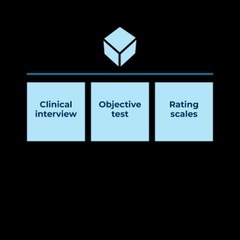ADHD Testing
Initial comprehensive assessment
Our ADHD testing begins with a thorough initial assessment to understand your unique needs. During this comprehensive evaluation, our experienced clinicians will review your medical history and medical background, conduct diagnostic interviews, and utilize standardized assessment tools to ensure an accurate diagnosis. This holistic approach allows us to develop a personalized treatment plan tailored to address your specific symptoms and challenges.
Please note that per company policy, ADHD stimulant medications can only be prescribed within a 50-mile radius of Restore Psychiatry & Wellness office locations.
Monthly follow-up
To ensure ongoing support and effective management of ADHD, we provide monthly follow-up appointments. These sessions allow us to monitor your progress, make necessary adjustments to your treatment plan, and address any concerns or questions you may have. Regular follow-ups are crucial in maintaining the effectiveness of your treatment and ensuring that you continue to make positive strides in managing ADHD.
Insurance Accepted: contact our office for rates
We understand the importance of accessible care, which is why we accept a variety of insurance plans. For specific rates and coverage details, please contact our office. Our team is here to assist you in navigating your insurance options and ensuring that you receive the best possible care without financial stress.
QbTest Telehealth
We are excited to announce the adoption of Qbtech, a global leader in objective ADHD testing. Qbtech is dedicated to transforming ADHD evaluation and treatment monitoring using FDA-cleared technology. Restore Psychiatry and Wellness joins a list of over 10,000 clinicians globally implementing the technology to further our mission of providing exceptional mental health care for current and future patients. QbTest provides an opportunity to improve our care model for patients struggling with ADHD by providing objective, tangible results for a more comprehensive ADHD evaluation and treatment management program.
What Should You Expect?
A diagnostic assessment for ADHD involves three main parts: gathering a clinical history through an interview with your provider, an objective measurement of symptoms remotely, and the completion of one or more rating scales.

What is QbTest Telehealth Powered by QbCheck?
QbTest Telehealth is an FDA-cleared test measuring all three core symptom domains; hyperactivity, impulsivity, and inattention. It is used when evaluating ADHD symptoms and measuring response to ADHD treatment.
Both the in-clinic (QbTest) and remote version (QbCheck) involve a 15 or 20-minute computer-based task that measures your (or your child’s) ability to maintain attention and impulse control.
Meanwhile, an infrared camera tracks movements, and therefore activity, during the test. The results are based on a comparison of your (or your child’s) performance with data from other people of the same sex and age.
What does the Telehealth set-up look like?
What do QbTest Telehealth results look like?
Sample QbTest Telehealth reports are shown here: Results PDF
When will I receive my results?
Adding objective ADHD technology can help to...
- Improve diagnostic accuracy
- Shorten time to diagnosis
- Capture treatment response not reflected by rating scales
Why Get Treated?
The Ramifications of Untreated ADHD
- Higher risk for lifetime and 1-year prevalence of antisocial, addictive, mood, and anxiety disorders
- Higher rates of frequent school disciplinary action against them
- Functional impairments persisting through to adulthood
- Significantly lower academic achievements
- Lower educational attainment, grade retention, and suspension
- Increased likelihood of dropping out of school
- Inattentive symptoms at constant levels throughout their life
- More impairment in social competence, behavioral and emotional adjustment
- Lower quality of life, as measured by self-report
- Early pregnancy
- Behavioural disturbance
- The feeling of parental incompetence
- Lower social esteem
- Antisocial behaviors
- Increased comorbidity of at least one psychiatric disorder
- Higher self-reported rates of anxiety and depression
- Higher risk of substance abuse
- Lower frequency of regular jobs
- Higher rates of unemployment
- Significantly more externalizing behaviors, including abuse and criminality
- Lower work performance and change jobs more frequently
- Lower occupational functioning
- Decreased overall educational achievement level
- Decreased average household incomes, regardless of academic achievement
- Report significantly poorer marital adjustment and family functioning
- More divorces
- Higher prevalence of oppositional, conduct, and substance abuse disorders
- Higher rate of risky driving behavior and suspension of driving license
- Decreased social-emotional competence & reduced salience of emotion in interpersonal interaction
- Difficulty engaging others in conversation
- Decreased tactfulness or ability to adjust their behavior to be appropriate for the situation.
- Heightened emotional reactivity, especially to contempt and disgust
- Less awareness of emotional cues made by others.
- Lower self-esteem